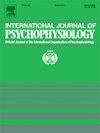夫妻冲突的核心:情绪调节和心脏反应
IF 2.5
3区 心理学
Q3 NEUROSCIENCES
引用次数: 0
摘要
适应性情绪调节可以缓冲急性应激下心脏的反应性。然而,面对人际压力时情绪调节的有效性研究却很少。因此,我们进行了一项实验,研究情绪调节是否可以缓冲冲突期间副交感神经介导的心脏反应。夫妻进行10分钟的冲突讨论(N = 253名参与者包括在最终分析中)。在讨论之前,每对夫妇中的一方被随机分配到三个实验条件(接受,认知重新评估,对照组)中的一个。在两个情绪调节组中,被操纵的伴侣被指示在接下来的冲突中应用接受或认知重新评估。迷走神经(即副交感神经)活动以心率变异性(HRV)参数RMSSD为指标,在基线和冲突期间进行评估。心脏反应性被操作为基线迷走神经活动和冲突期间迷走神经活动之间的差异。与对照组相比,这两种情绪调节策略都显著降低了被操纵伴侣的心脏反应性。因此,我们初步发现,在急性人际压力期间,情绪调节可能有利于改变副交感神经介导的心脏反应性。本文章由计算机程序翻译,如有差异,请以英文原文为准。
At the heart of couple conflict: Emotion regulation and cardiac reactivity
Adaptive emotion regulation can buffer against cardiac reactivity under acute stress. However, research on the effectiveness of emotion regulation in the face of interpersonal stress is scarce. We therefore conducted an experiment investigating whether emotion regulation might buffer against parasympathetically mediated cardiac reactivity during conflict. Couples engaged in a 10-min conflict discussion (N = 253 participants included in the final analyses). Prior to the discussion, one partner per couple was randomly assigned to one of three experimental conditions (acceptance, cognitive reappraisal, control group). In both emotion regulation groups, the manipulated partner was instructed to apply either acceptance or cognitive reappraisal during the following conflict. Vagal (i.e., parasympathetic) activity as indexed by the heart rate variability (HRV) parameter RMSSD was assessed at baseline and during conflict. Cardiac reactivity was operationalized as the difference between baseline vagal activity and vagal activity during conflict. Both emotion regulation strategies significantly reduced cardiac reactivity in the manipulated partner as compared to the control group. We thus found preliminary support that emotion regulation may beneficially alter parasympathetically mediated cardiac reactivity during acute interpersonal stress.
求助全文
通过发布文献求助,成功后即可免费获取论文全文。
去求助
来源期刊
CiteScore
5.40
自引率
10.00%
发文量
177
审稿时长
3-8 weeks
期刊介绍:
The International Journal of Psychophysiology is the official journal of the International Organization of Psychophysiology, and provides a respected forum for the publication of high quality original contributions on all aspects of psychophysiology. The journal is interdisciplinary and aims to integrate the neurosciences and behavioral sciences. Empirical, theoretical, and review articles are encouraged in the following areas:
• Cerebral psychophysiology: including functional brain mapping and neuroimaging with Event-Related Potentials (ERPs), Positron Emission Tomography (PET), Functional Magnetic Resonance Imaging (fMRI) and Electroencephalographic studies.
• Autonomic functions: including bilateral electrodermal activity, pupillometry and blood volume changes.
• Cardiovascular Psychophysiology:including studies of blood pressure, cardiac functioning and respiration.
• Somatic psychophysiology: including muscle activity, eye movements and eye blinks.

 求助内容:
求助内容: 应助结果提醒方式:
应助结果提醒方式:


